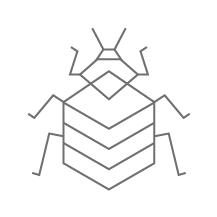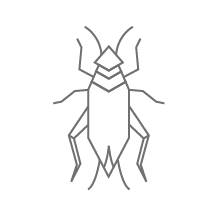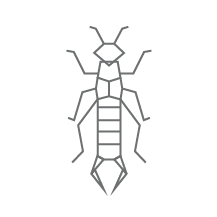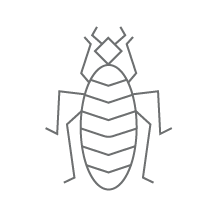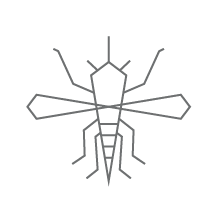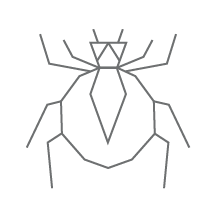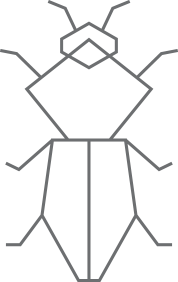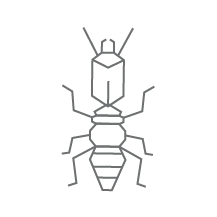
Local Office
Commercial and Residential Pest Control Services | Dodson Bros. Exterminating Co., Inc.
Angoumois Grain Moths

Adults cause no damage. The larva requires a whole kernel or caked material for development. The pest is active at low temperatures and can cause considerable damage during the winter.
Infested grain has a sickening smell and taste, which make it unpalatable.
Inspect all grains upon purchase. Freeze grains for at least 1 week (or store permanently in the freezer) to kill any eggs. Buy grains in small quantities and eat within a reasonable period of time. Store grains in tightly sealed glass, metal or sturdy plastic containers (not bags). Regularly clean pantry cracks, crevices and shelves.
Cigarette Beetles
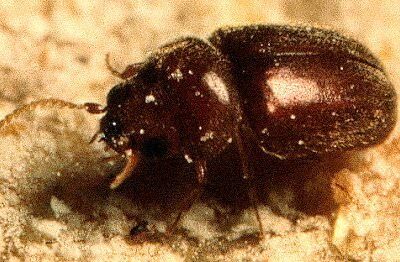
The cigarette beetle attacks a host of items such as paprika, dry dog food, beans, biscuits, chickpeas, cigars, cigarettes, cocoa beans, coffee beans, cottonseed, dates, dried banana, dried cabbage, dried carrot, dried fruits, drugs, flour, dried flowers, ginger, grains, herbs, peanuts, pepper, raisins, rice, yeast, seeds, spices, furniture stuffing, bookbinder’s paste and books, and even insecticides containing pyrethrum. It also attacks animal material such as dried fish, fish meal, meat meal, leather, silk and even dried insects. Dry dog food and paprika are the most commonly attacked in the home.
Larval feeding causes direct damage to foodstuffs and non-food items. These products are contaminated by the presence of beetles, larvae, pupae, cocoons, frass (fecal material), and insect parts.
Controlling cigarette beetles in homes begins with a thorough inspection. Since these beetles can feed on such a variety of products, it is important to find all infested items. Discard any food that is infested.
Drugstore Beetles

The drugstore beetle attacks a host of items that include any household food and spice, as well as such things as drugs, hair, horn, leather, and museum specimens. Most commonly attacked are bread, flour, meal, breakfast foods and condiments such as red pepper. It is also a pest of books and manuscripts.
Feeding causes direct damage and contamination to foodstuffs and non-food items.
Controlling drugstore beetles begins with a thorough inspection. It is important to find everything that the beetles have infested. In the kitchen, throw away any infested food. Clean pantry and cabinet shelves with a vacuum. It is advisable to call a pest control professional to do treatment.
Granary Weevil

Because its wings are vestigial, the granary weevil is confined to stored grain and is primarily transported by man.
Granary weevils can contaminate grain stores.
Inspect all grains upon purchase. Freeze grains for at least 1 week (or store permanently in the freezer) to kill any eggs. Buy grains in small quantities and eat within a reasonable period of time. Store grains in tightly sealed glass, metal, or sturdy plastic containers (not bags). Regularly clean pantry cracks, crevices and shelves.
Indian Meal Moth

Indian meal moths like to feed on dried fruits, grains, seeds, nuts, chocolate, candies, bird seed, dog food, powdered milk, dried red peppers and candy.
Indian meal moths infest foods and can contaminate food products.
Dried food products should be inspected thoroughly for signs of Indian meal moth infestations. Discard infested foods in outdoor trash bins. Clean infested cupboards thoroughly with a vacuum and soap and water. Store food in sealed containers.
Sawtoothed Grain Beetles

The sawtoothed grain beetle does considerable damage to grains but it cannot attack sound kernels. Its flat body form permits access through very small cracks and into imperfectly sealed packages.
Sawtoothed grain beetles can infest stored food products and can contaminate food.
Seal all cracks and crevices that may offer entry to your house. Check areas where pet food and birdseed are stored. Empty cabinets and pantries and check every package. Throw away infested food. Vacuum the empty shelves to remove any insects and food particles. Store new food products in tightly sealed glass or plastic containers.
